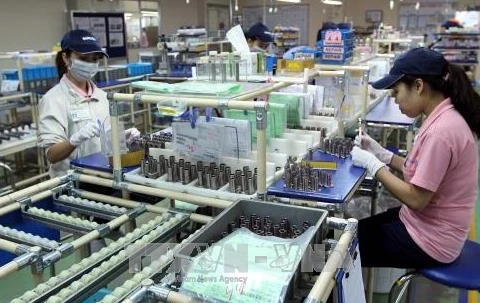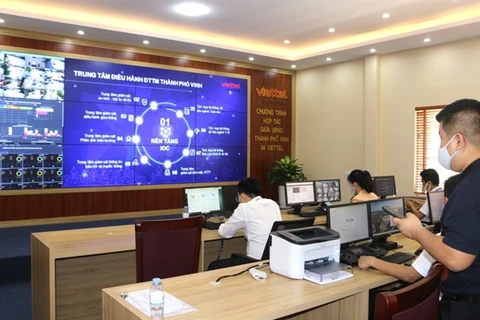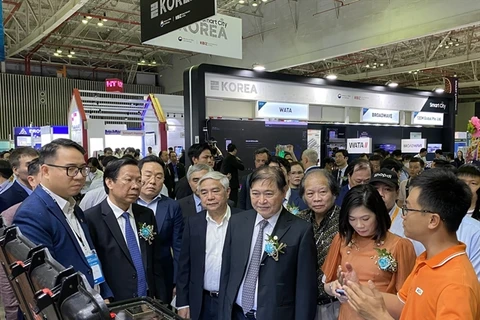HCM City (VNS/VNA) - Building digital data has been identified as a core element in Ho Chi Minh City’s digital transformation and smart-city development, and the city has begun a data building strategy, according to its Department of Information and Communications.
Speaking at a seminar titled “Vietnamese Smart City Strategy: Achievement and Challenges in HCM City” on April 12, Vo Thi Trung Trinh, the department’s deputy director, said the city aims to become smart with e-government, e-enterprises and an electronic society by 2030.
She said it would focus on developing three main data groups by 2025: citizens (administrative, civil status, health, education, and welfare), finance-business (summary and statistics of budget revenue and expenditure, public investment management, enterprises, and household businesses), and land-urban areas (geographical information, construction, transport, and planning and architecture).
All would be stored and managed at the city’s data centre, she said.
“We aim to have a digital governance system by 2025, and so digital data is indispensable.
“The city is focusing on developing databases and policies to support the application of these data in digital governance and utilise the data to drive the digital economy and data economy.
“Currently the digital economy accounts for about 18% of the city’s gross regional domestic product, and is expected to account for 40% by 2030.
“We want data to be a raw material for the city's digital economy development. Good data management will help boost socio-economic development, productivity and competitiveness.”
Going forward, data would be the city’s core asset, and it would have regulations for sharing and use of data by administrative departments to better serve the people, she said.
The city would encourage the effective use of shared data to promote innovation and start-ups, she added.
Nguyen Phu Tien, deputy director of the National Digital Transformation Department, said provinces are also making their cities smart, but their focus is still mainly on services and utilities associated with e-governance and digital government, and they do not pay much attention to smart city management to address fundamental urban issues like transportation, environment, healthcare, and education.
Many localities are facing difficulties with their smart city projects and need new direction from the Government, he said.
Vietnam wants to learn from other countries that have successfully developed smart cities, he added.
The seminar was held as part of the Smart City Asia International Expo and Forum 2023 being held in HCM City from April 13 from 15./.
Speaking at a seminar titled “Vietnamese Smart City Strategy: Achievement and Challenges in HCM City” on April 12, Vo Thi Trung Trinh, the department’s deputy director, said the city aims to become smart with e-government, e-enterprises and an electronic society by 2030.
She said it would focus on developing three main data groups by 2025: citizens (administrative, civil status, health, education, and welfare), finance-business (summary and statistics of budget revenue and expenditure, public investment management, enterprises, and household businesses), and land-urban areas (geographical information, construction, transport, and planning and architecture).
All would be stored and managed at the city’s data centre, she said.
“We aim to have a digital governance system by 2025, and so digital data is indispensable.
“The city is focusing on developing databases and policies to support the application of these data in digital governance and utilise the data to drive the digital economy and data economy.
“Currently the digital economy accounts for about 18% of the city’s gross regional domestic product, and is expected to account for 40% by 2030.
“We want data to be a raw material for the city's digital economy development. Good data management will help boost socio-economic development, productivity and competitiveness.”
Going forward, data would be the city’s core asset, and it would have regulations for sharing and use of data by administrative departments to better serve the people, she said.
The city would encourage the effective use of shared data to promote innovation and start-ups, she added.
Nguyen Phu Tien, deputy director of the National Digital Transformation Department, said provinces are also making their cities smart, but their focus is still mainly on services and utilities associated with e-governance and digital government, and they do not pay much attention to smart city management to address fundamental urban issues like transportation, environment, healthcare, and education.
Many localities are facing difficulties with their smart city projects and need new direction from the Government, he said.
Vietnam wants to learn from other countries that have successfully developed smart cities, he added.
The seminar was held as part of the Smart City Asia International Expo and Forum 2023 being held in HCM City from April 13 from 15./.
VNA























